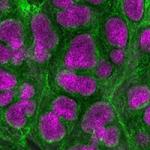
H. Efsun Arda, Ph.D.
Stadtman Investigator
Laboratory of Receptor Biology and Gene Expression
NCI/CCR
Research Topics
The pancreas is a vital organ containing hormone-producing cells organized into islets of Langerhans, whose crucial function is to regulate blood glucose levels. Improper regulation of blood glucose leads to diabetes mellitus, a disease that affects more than 10% of the U.S. population. Further, uncontrolled growth of pancreatic cells leads to pancreatic ductal adenocarcinoma, which ranks 4th among cancer-related deaths in the U.S. To understand the molecular anomalies that lead to organ dysfunction and disease, it is crucial to define how the information encoded in the human genome is used at the cellular level to establish tissue and organ systems. The research goals of the Arda Lab are to delineate the gene regulatory networks that control the development, expansion and function of human pancreatic cells. We combine cutting-edge genomic approaches with use of primary human cells, stem cell and genome-editing technologies to build comprehensive maps of regulatory genomes governing the establishment and growth of human pancreatic cell lineages.
Biography
H. Efsun Arda obtained her Ph.D. from University of Massachusetts Medical School. During her doctorate training in Dr. Marian Walhout’s group, she studied gene regulatory networks that pertain to the metabolism of the model organism, C. elegans. She uncovered a set of metabolic genes that are sensitive to the nutrient content of C. elegans bacterial diet.
Driven by her interest in gene regulatory networks and developmental biology, Dr. Arda joined the laboratory of Dr. Seung Kim at Stanford University for her postdoctoral training. As a JDRF fellow, she developed cell sorting methods to purify primary pancreatic cells from children and adults, and used RNA sequencing to reveal hundreds of genes that are differentially regulated during the first 10 years of human lifespan, several of which are linked by association studies to diabetes risk. To understand how pancreatic cell type-specific gene expression programs are controlled at the genomic level, she then combined cell sorting with robust genomic techniques, like ATAC-Seq to delineate the regulatory chromatin landscape of human pancreatic cell types. This work revealed thousands of putative enhancer regions that explain cell type-specific gene expression in the human pancreas. Recently, she has been characterizing the cell lineages that give rise to human pancreas using single-cell methods.
Related Scientific Focus Areas
This page was last updated on Monday, January 12, 2026




